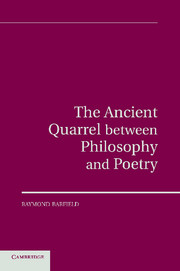Book contents
- Frontmatter
- Contents
- Acknowledgments
- Introduction
- 1 Socrates, Plato, and the Invention of the Ancient Quarrel
- 2 Aristotle, Poetry, and Ethics
- 3 Plotinus, Augustine, and Strange Sweetness
- 4 Boethius, Dionysius, and the Forms
- 5 Thomas and Some Thomists
- 6 Vico's New Science
- 7 Kant and His Students on the Genius of Nature
- 8 Hegel and the Owl of Minerva
- 9 Kierkegaard: A Poet, Alas
- 10 Dilthey: Poetry and the Escape from Metaphysics
- 11 Nietzsche, Heidegger, and the Saving Power of Poetry
- 12 Mikhail Bakhtin and Novelistic Consciousness
- Index
- References
8 - Hegel and the Owl of Minerva
Published online by Cambridge University Press: 03 May 2011
- Frontmatter
- Contents
- Acknowledgments
- Introduction
- 1 Socrates, Plato, and the Invention of the Ancient Quarrel
- 2 Aristotle, Poetry, and Ethics
- 3 Plotinus, Augustine, and Strange Sweetness
- 4 Boethius, Dionysius, and the Forms
- 5 Thomas and Some Thomists
- 6 Vico's New Science
- 7 Kant and His Students on the Genius of Nature
- 8 Hegel and the Owl of Minerva
- 9 Kierkegaard: A Poet, Alas
- 10 Dilthey: Poetry and the Escape from Metaphysics
- 11 Nietzsche, Heidegger, and the Saving Power of Poetry
- 12 Mikhail Bakhtin and Novelistic Consciousness
- Index
- References
Summary
The poet “out of his mind” is not trustworthy if our aim is wisdom. A philosopher cut off from the root and source of wisdom is no better. We want our souls to grow. We want our living consciousness of what is real and true to expand. Hegel is the philosopher of consciousness. Before he gave The Phenomenology of Spirit its final title, he had as his subtitle “Science of the Experience of Consciousness.” Though consciousness ranges across all things, from sense experience to the objects of art and religion, philosophy is ultimately and uniquely about our being in the world, a kind of living consciousness that is the fullness of self-knowledge. In The Philosophy of Right, Hegel warns, “When philosophy paints its gray on gray, then has a form of life grown old, and with gray on gray it cannot be rejuvenated, but only known; the Owl of Minerva first takes flight with twilight closing in.” It is this “gray on gray” that is resisted by a philosophy that aims to grow the consciousness of seekers as they experience the world.
In much of the quarrel, the poets engage as prophetic figures used as the voice of the gods for better or worse, their words received and brought to fullness of understanding by the philosophers. At many points in this history, poetry has functioned as a means of gaining access to the “transcendent” in one form or another, moving past the mundane immanent world, however much such claims labor under suspicion.
- Type
- Chapter
- Information
- The Ancient Quarrel Between Philosophy and Poetry , pp. 168 - 188Publisher: Cambridge University PressPrint publication year: 2011



